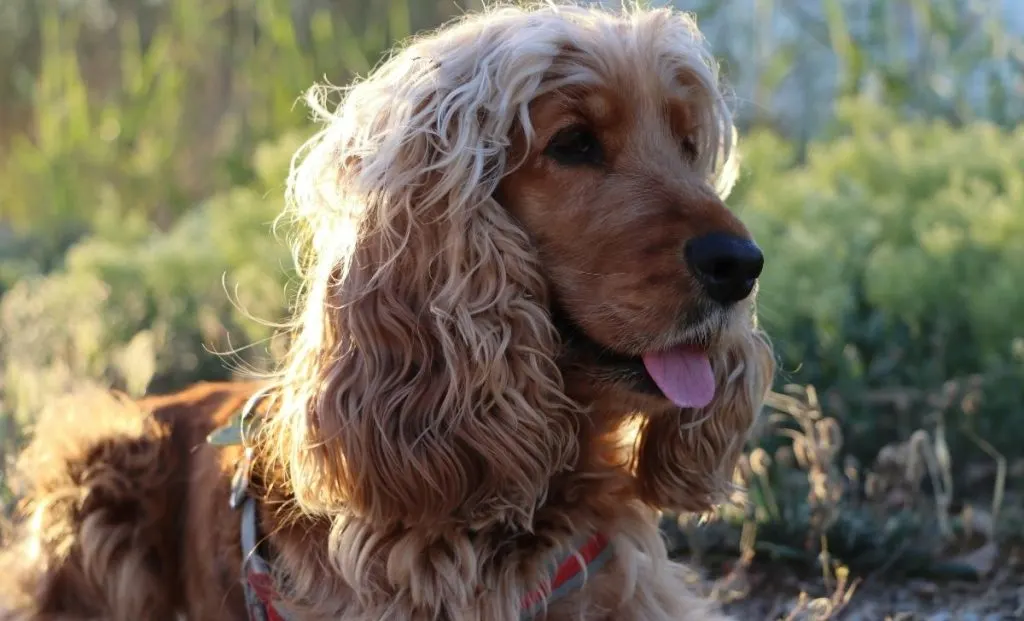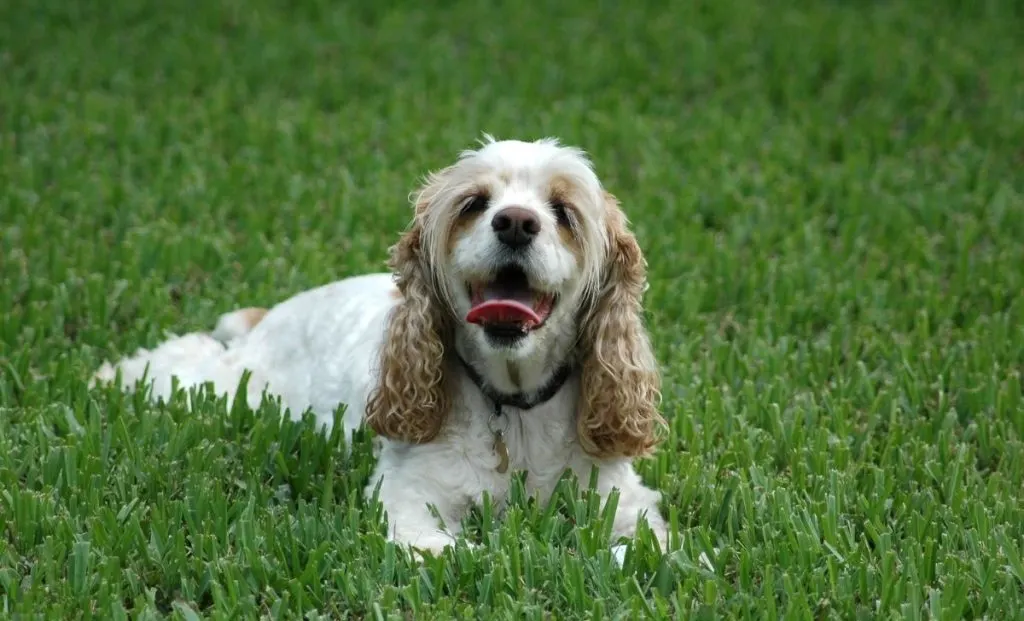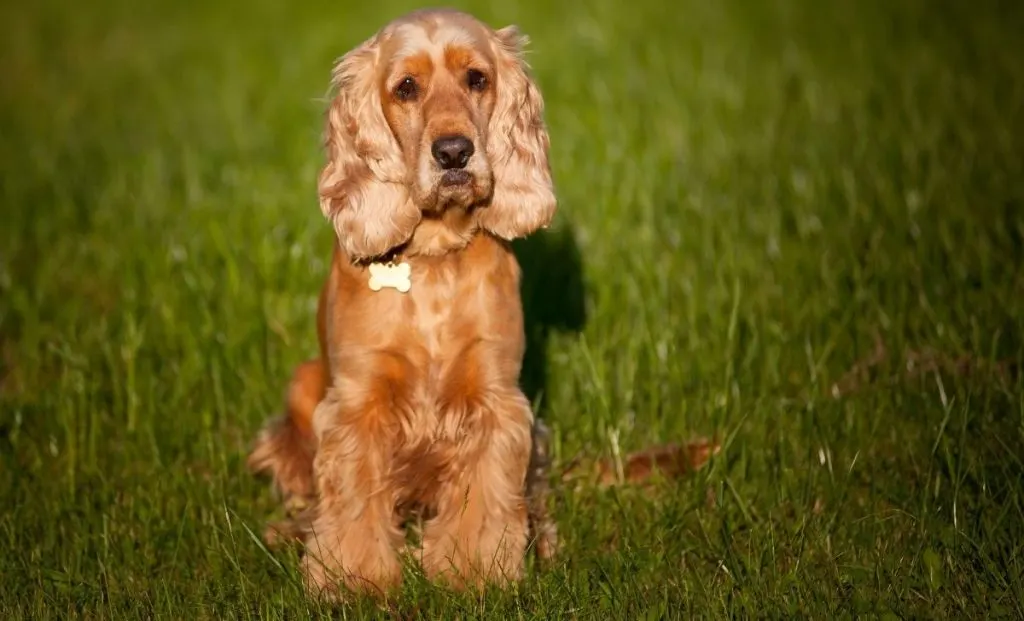Are you planning on getting a Cocker Spaniel puppy but want to know more about their development? Well, then, you need to get familiar with Cocker Spaniel’s growth stages and growth charts!
We, as pet parents, have lots of things on our shoulders, especially when dealing with small puppies. One of the best ways to know whether something is wrong with your pup is to monitor his growth. If you notice that he is behind his littermates, this can be an indication of something more serious.
So, how do you know whether your Cocker Spaniel is of the right size? And what are some factors that can affect a dog’s size?
Let’s learn together!
Cocker Spaniel Growth Chart
| Age | Height | Weight |
|---|---|---|
| 1 month | 6 – 8 inches | 2 – 4 lbs |
| 2 months | 8 – 10 inches | 3 – 5 lbs |
| 3 months | 9 – 11 inches | 8 – 11 lbs |
| 4 months | 10 – 12 inches | 12 – 15 lbs |
| 5 months | 11 – 13 inches | 16 – 22 lbs |
| 6 months | 12 – 14 inches | 20 – 24 lbs |
| 7 months | 12 – 15 inches | 21 – 25 lbs |
| 8 months | 13 – 16 inches | 22 – 26 lbs |
| 9 months | 13 – 16 inches | 23 – 27 lbs |
| 10 months | 14 – 17 inches | 24 – 28 lbs |
| 11 months | 14 – 17 inches | 24 – 29 lbs |
| 12 months | 14 – 18 inches | 25 – 30 lbs |
Cocker Spaniel Growth Stages

Cocker Spaniels are medium-sized dogs and one of the most popular Spaniel breeds. They have distinguishable physical appearance due to their long, floppy ears, and curly coats that come in various colors.
Do you know Lady from Disney’s classic The Lady and the Tramp? That’s a Cocker Spaniel dog!
Did you know there are two types of Cocker Spaniels? The English Cocker Spaniel and the American Cocker Spaniel! While both are very similar, they do have some differences. For example, the English variety is somewhat larger.
While I’ll focus on the American variety in this article, there are plenty of Cocker Spaniel breeders in the UK that focus on the English breed, and they’ll be able to give you precise guidelines on this type.
Here’s everything you need to know about Cocker Spaniel growth stages:
0 – 1 Month
The first two weeks of your Cocker Spaniel life are known as the Neonatal stage, and during this time, the puppies are entirely reliant on their mothers. They need them for both feeding and warmth, and won’t spend any time away from them.
In fact, your Cocker Spaniel puppies are unlikely to do anything but nurse and sleep before they are one month old. They will be fully blind and deaf until around three weeks of age.
While most Cocker Spaniel parents will be careful and nurturing about puppies, some dogs are known to eat their younglings, so make sure to monitor your new doggy family, especially if this is the mother Cocker Spaniel’s first litter.
Monitor your pup’s average weight throughout this time. If you notice he is smaller than his littermates or that he is losing weight fast, contact your vet as soon as possible.
Cocker Spaniel puppies are very delicate during this time, and any health issues need to be addressed as quickly as possible.
1 – 3 Months

By the time your puppies are one month old, they will open their eyes fully and start exploring the world around them.
While they might not immediately be as curious as one might suppose from small pups, you’ll quickly notice their uncanny ability to get into all kinds of mischievous activities from the earliest ages.
As they become more independent, they’ll also start to wean off from their mother’s milk.
When introducing puppy food to your young Cocker Spaniels, make sure to go slowly to avoid tummy aches. Any sudden change in diet might cause short-term digestion problems, such as diarrhea and vomiting.
This is also the earliest socialization stage, as Cocker Spaniel puppies should get used to other people and animals as quickly as possible.
By the time your puppies are two months old, their calm demeanor and individual personalities will start to shine, and you’ll quickly learn to differentiate the puppy you’ve chosen from the rest of the litter.
This is too early to start training, as puppies are still too weak to have extensive training sessions.
Still, most breeders will allow their puppies to go home by the time they are eight to 10 weeks old to help them create strong bonds with their future families and owners.
3 – 6 Months
At this juvenile stage, your Cocker Spaniels will act like young teenagers. Fortunately, as this is a breed with a calm and gentle demeanor, they won’t be too rebellious, but you might still have a hard time keeping them at bay.
This is also the time when you should start training your pup. While Cocker Spaniels don’t require too much training, you still want to make sure your puppy is obedient to avoid accidents and any potential issues.
By this the, the initial growth spur will end, although it might still seem as if your Cocker Spaniel is growing taller each week.
Also, by the end of this period, your puppy should have completed all of his vaccines and deworming medications. This means your pooch is finally able to go out in the park and befriend other dogs and animals without the dangers of any contagious diseases.
6 – 12 Months

By the time your pooch is six months old, he will almost resemble a full adult. His physical needs will change, and with that, his dietary needs change, as well. This means it’s time to introduce him to adult dog food!
Once again, make sure this transitional period is not too sudden, as your pup might not deal with it well. Mix a bit of adult dog food with his puppy diet, and increase the amount every few days, until he is left with adult food only. This way, you’ll avoid tummy upset.
This is also the time when your Cocker Spaniel will reach sexual maturity, which means it’s time to contemplate neutering or spaying. Consult your vet about what the best time for these procedures is.
Finally, by the age of 8 months, your Cocker Spaniel should reach his full size – although in some dogs this doesn’t happen before their first birthday.
This doesn’t mean your dog’s measures won’t change any more. However, he is more likely to grow in weight than in height, as his muscle mass develops further.
Congratulations! Your Cocker Spaniel is now a fully grown adult dog.
Factors That Affect Cocker Spaniel’s Growth

If you notice your Cocker Spaniel is a bit smaller or larger than the growth chart recommends, don’t start panicking immediately. Just like humans, all dogs have an individual growth rate. Some are late bloomers, while others will grow at a faster pace.
There are many factors that can affect your Cocker Spaniel’s growth, from physical needs to genetics. Not all are a cause of concern.
However, if you notice your Cocker Spaniel is much smaller than he should be at a certain age, maybe it’s time to visit a vet. This will help you rule out any problematic health concerns or genetic conditions.
Here are some of the common factors that can affect your puppy’s growth:
Genetics
Just as is the case with all living beings, genetics are the main cause of physical appearance. This includes everything from coat color and body shape to adult size.
If possible, try to get some information about your Cocker Spaniels’ parents or close family. Were they smaller than usual, or did they grow very slowly? If this is the case, then your pup isn’t growing at the average pace due to its genes.
Another reason why your Cocker Spaniel might be small is because he might actually be some Cocker Spaniel mix.
If you didn’t buy from proper Cocker Spaniel breeders, chances are you’ve ended up with a crossbreed, possibly with a smaller Spaniel breed such as a Cavalier King Charles Spaniel. This might explain why your otherwise healthy pup is much smaller than average Cockers.
There is nothing wrong with getting crossbreeds. However, if you get a mutt without realizing it, you’re getting a dog with different genetics. This could affect not only its size but also its health and behavior, as well.
Diet
A balanced diet is another big factor when it comes to healthy development.
Different dogs might need different diets, depending on their activity levels, size, and respective ages. On rare occasions, even two dogs that are of the same breed might need different amounts of food due to them not having the same amount of exercise.
Cocker Spaniels are moderately active dogs. They don’t need as much exercise as some other dog breeds, which also means they don’t require as many calories.
This doesn’t mean you can get away with providing them with a bland diet that doesn’t have high nutritional value. All dogs need a proper amount of proteins, fats, carbs, vitamins, and minerals to grow tall and healthy.
Malnutrition, especially at an early age, is one of the main reasons why your Cocker Spaniel puppy might grow slower than its peers. Without essential nutrients, a dog’s body cannot develop properly.
Check the quality of the dog food you’re giving him, and maybe change the brand if you suspect it’s not giving your pup everything he needs.
Ensure your doggie doesn’t have any food sensitivities or allergies that might be causing digestive issues that can result in malnutrition.
Make sure you give your Cocker Spaniel enough food each day. This will change as he ages.
Finally, don’t go overboard, as Cocker Spaniels are prone to obesity.
Training
Physical activity is yet another reason why your Cocker Spaniel might not be growing properly.
As mentioned before, Cocker Spaniels are not too energetic dogs. However, this doesn’t mean they don’t require daily exercise.
Every adult Cocker Spaniel needs to be taken on daily walks and jogs. The same goes for older puppies that are strong enough to go walking in the park.
Also, Cocker Spaniels need at least one exercise session each day. This doesn’t have to be extensive; a good play session, such as a game of fetch, can be enough.
If you didn’t make sure your pooch had enough physical activity in crucial developmental stages of his life, he is at a higher risk of bone and joint disorders, such as hip dysplasia or luxating patella.
Any of these conditions can further affect the proper muscle development, which might result in your pup growing smaller than average.
However, it is also problematic if your pup’s exercise routine and training sessions are too extensive. This, too, can be harmful to your pup’s bones and cause issues similar to having too little activity.
Balance is the key to making sure your pooch grows the right way.
Health
There are certain health conditions that might also be the cause of your Cocker Spaniel staying too small.
For example, if your Cocker Spaniel puppy gets tapeworms or hookworms, these intestinal parasites will prevent him from getting all the proper nutrients. This will cause malnutrition, just as would be the case if you weren’t feeding your pup enough.
The good thing is that your dog’s growth rate should go back to normal once he has been treated.
Another reason why your Cocker Spaniel might be too small is due to congenital abnormalities.
Spaying and neutering might also affect your dog’s size. Studies have shown that early spaying and neutering might affect a dog’s growth plate, causing it to close later than usual. As a result, your pup might grow larger than average.
Of course, this doesn’t mean that you shouldn’t fix your dog on time. All fur parents should consult with their vets about this procedure to determine when is the right time to go with it.
Common Health Problems Of Cocker Spaniels
Luckily, both American and English Cocker Spaniels are a fairly healthy breed, so the chance of your pup developing some health condition that will affect its growth is fairly minimal – provided your pup has been dewormed and vaccinated at the early stages of development.
Still, some of the health issues you might need to be on the lookout for include:
- Bone and joint problems, which do affect a dog’s development if they occur early on
- Hereditary eye disorders
- Ear infections
- Cancer
Your pooch is likely to live a long and healthy life, as the average lifespan of a Cocker Spaniel is around 11-12 years.
How To Help Your Cocker Spaniel Grow
There are a few things you can do to make sure your Cocker Spaniel grows nice and tall.
Make sure to provide him with a balanced diet rich in not just essential nutrients, but also omega-6 and omega-3 fatty acids that can help his skin and bones stay strong.
Provide him with proper training and exercise regime. Contact a local dog trainer if you need any training tips, although I am certain you won’t have any issues in keeping your Cocker Spaniel occupied.
Regular checkups at the vet are essential, as these can help you be knowledgeable about your dog’s overall health.
There’s one thing that I have to mention, though: Don’t try to force your dog to grow larger or smaller than he is meant to.
There is a reason why Cocker Spaniel growth stages occur at a certain point in a dog’s life, and by messing with this, you might mess with his overall health, and this is never a good thing.
In the end, the most important thing is that your dog is happy and healthy. Nothing else should matter as much.

Vanja’s passion for writing started at an early age, which is why she pursued Journalism as her college degree. She can research any topic and find all the information before you bat an eye, which is a great thing for her job but a terrible one for her husband.
Even as a young child, she fell in love with everything fluffy – but dogs have a special place in her heart due to her childhood companion, a Corgie named Archie.
Motivated by her experiences and driven by a desire to give back to her four-legged companions, she spends her free time volunteering at a local dog shelter.
